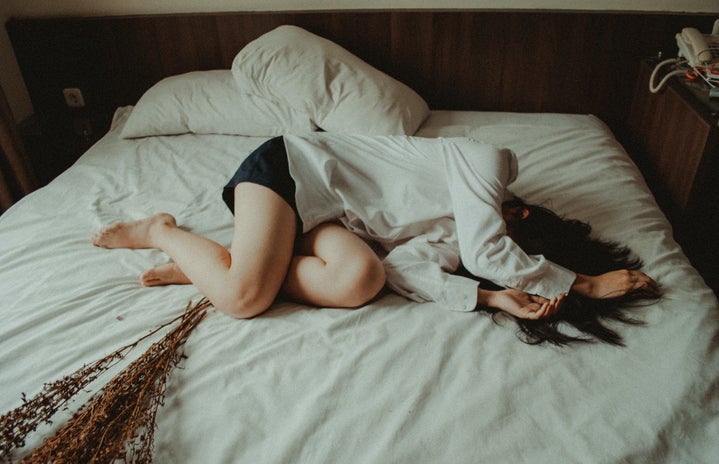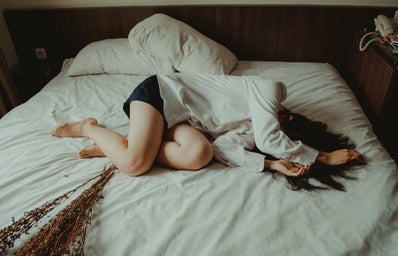COVID-19 has taken so many different things away from college students. Without the ability to go to college football games or bars around town, we thought that there was not really any way for us to get the virus. We did not go out anywhere we thought would be unsafe and only hung out with people we felt weren’t going to give us the virus. We wore masks everywhere we went, but you can see how well that worked out for us. It seems that you can do everything right and sometimes the odds are not in your favor. Unfortunately, that is what happened to us. But we worked through our positive tests together and it was very nice to have a friend who was in the exact same position. This article is going to talk about how the two of us worked through our isolation and offer advice for people going through a similar situation.
Margaret’s Story
Originally, I thought my test was a false positive. I did not really come to terms with my diagnosis for a few minutes after I received the phone call. I was asymptomatic and felt completely normal the whole time I was in isolation, which actually made it a lot harder for me to stay in one room all day. I spent all day, everyday for 10 days sitting in my bed feeling fine even though I was sick. If I had felt at least sick, it would have been a lot easier to stay in bed all day and relax rather than showing no symptoms and being bored out of my mind. This is my list of tips and tricks for people who are in similar situations and have a similar personality to mine!
I am such an extroverted person and did not think I could make it 10 days without having any form of human interaction. My dad was the only person in my family who would come downstairs and talk to me because everyone else was kept away unless absolutely necessary. I’m very close with both of my siblings and my mom, and being at home but not able to hang out with them was not fun at all. A big piece of advice I have for fellow extroverts who cannot handle isolation is to FaceTime your friends as often as you can. Talking to someone isn’t the same as seeing them in person but it really does help to get through your emotions and learn about what is going on in their lives. I would also suggest setting up a chair 6 feet away from where you will be sitting.

This will give your family and friends an opportunity to come talk to you without being in close contact with you. It helped me having a chair so I could enjoy talking to my dad without worrying about passing the virus to him, which was a very big fear of mine as he has a heart condition.
I also am someone who gets very in my head about everything and I’m constantly overthinking things. But because I had to reaffirm myself without others around, I’ve learned a lot about myself and have taken up some new hobbies. I really did learn how to better prevent myself from spiraling down and constantly belittling myself which I really have struggled with in the past. I figured out how to entertain myself without the help of Netflix and books.

During high school and college, I gave up on reading for pleasure and only read books I was required to read. Isolation gave me a chance to read The Twilight series all over again and I loved it. And don’t get me wrong, I watched a bunch of Netflix during my 10 day isolation, but I also learned I’m very good at creative writing. I worked on a journal and story over quarantine and I think it turned out very well. Some shows I would recommend to keep yourself busy and are extremely long would be Grey’s Anatomy, which has been my go-to show for years, and Big Mouth.
I had to force myself to do schoolwork a lot of the time because I would get distracted by Netflix very easily. Grades have been such an important part of my life since I was a little kid and I remember always pushing myself to get high grades. Sitting around all day pulled me out of the daily routine I had for doing my schoolwork.

Stock up on snacks and drinks that will help you get through the week. Comfort eating is a very real thing and I found that having my favorite candy bars and goldfish made me feel better about being stuck in a room for 10 days.

My final piece of advice for everyone who has to go into isolation or quarantine would be to take care of yourself. If you need to go outside to help you feel normal again, do it. (Just don’t touch anything!) Go for walks or a run and enjoy being somewhere that isn’t the same room that you’ve been banished to. Make sure you have a good mindset going into quarantine. After you get tested, prepare for the worst and hope for the best.
Beth’s Story
My isolation began a few days before Margaret’s, and unlike her, I had some moderately bad symptoms. There was one day that was head and shoulders above the rest, which was the day I decided to get tested and went into isolation. But the fatigue and lethargy remained for the whole of my quarantine.
The first few days, when I was isolated but had not yet been sent home to quarantine, were the hardest. I was tired all the time and living in an empty room with just a tote of my own stuff. My performance in school is deathly important to me like Margaret, and because my situation disabled me from working at my normal productivity level, my self-worth suffered. This on top of not being able to be with friends or family to talk about it made for a truly bleak combination. (Don’t be scared, it got better!)
If you are anything like me and should find yourself in a similar situation, I have a few practices that helped to shield me from the self-doubt and loneliness I was experiencing. First, make a conscious effort to respond to what your body is telling you, and most importantly, find a way to be okay with these choices! During the first few days, I found that I had to lie down for about 30 minutes every hour or two to recover from the exhaustion of schoolwork. I didn’t even sleep, I just laid in bed listening to music and relaxing. If my inner critic started to creep in, I reminded myself that respecting my body and its limits is never counterproductive! I recommend finding a way to give your mind and body a break. More importantly, listen to your body and take a break anytime you feel down.

I am a bona fide introvert, so I would go hours without contacting a soul. This backfired on day three when I was feeling extra down. I waited FAR too long to FaceTime my sister, mother, and roommates. Because I spent so long just brooding all alone in my empty room, I just kept feeling worse and worse. My advice to you, introverts, is this: I know it’s nice to spend some time alone, but learn from my mistake and do not hesitate to call someone at the first sign of icky feelings! Family and friends can bring you back down to earth and remind you that you’re not alone in a profound way.

Things started to look up when I got settled in at home. I was in a comforting space with my family. Like Margaret, though, I am very close with my siblings and it sucked that I couldn’t see them. I was at home, but this was unlike anything I had experienced before. I found it hard to establish a routine that worked with my schoolwork as well as my incessant sleeping. To gain a semblance of sanity, it was useful for me to designate certain spaces for different purposes and honor those designations. For example, if I needed a break to watch TikToks, I would leave my desk and chill on the couch. Similarly, I would only do schoolwork at my desk or a table, never the couch or my bed. This made those chill places extra happy and relaxed and gave me some structure when everything felt scattered. Organization, even in a small way like this, is a great way for you to gain a sense of control if you feel powerless.
Dealing with the uncertainty of COVID-19 is hard if you’re type A or an introvert, but find comfort by knowing you’re not alone and trusting yourself.
We tested positive, we went home, we almost went crazy, we FaceTimed, and we watched a lot of Big Mouth. This whole experience feels like a fever dream, but now that we’re out of it, it’s apparent that we actually learned a lot about ourselves. (Barring, of course, how we actually got COVID-19; we still have no idea). We figured out a way to adapt, and we truly hope that our story can be helpful to anyone who has to undergo a similar experience. More than that, this ordeal revealed some practices that are useful all the time, not just when you’re sick. Getting isolated for two weeks sucks, extrovert or not. But here’s the beautiful thing: you’re way stronger than you think.





